Written by Chief Louis M. Barry in 2000, in celebration of the department’s 50th anniversary. Updated in 2015 by Chief Alan Wishart, Sergeant Kevin O’Grady and Chief Louis M. Barry (ret.). Much of the information came from the annual Police Department report and recollection of members. If you see any inaccurate information, please email kogrady@granbypd.org.
The Granby Police Department came into existence on Oct. 26, 1950, after a special town meeting session. The minutes state:
“In accordance with the foregoing warrant, the inhabitants of Granby qualified to vote in elections and Town affairs, met at the Granby School Auditorium at 8:00pm and voted as follows:
Meeting was called to order by Moderator
Town Clerk read the Warrant
Recess for 10 minutes for a quorum…”
Article 1
Voted to accept Section 97 of Chapter 41 of the General Laws enabling the establishment of a Police Department
Motion passed”
In more than 70 years since, the department has undergone many changes and grown from a one-man operation to a department with many community and sports functions, in addition to its law enforcement duties.
In February 2020, Allan Brooks was appointed part-time patrolman from his auxiliary position. In June, part-time patrol officer Sean Gallagher retired from the department. In September, Chief Wishart announced his retirement, effective July 1, 2021.
On July 1, 2021, Chief Wishart retired after 29 years of service. Lieutenant O’Grady was named interim police chief on the same day.
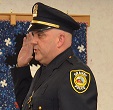
In January 2022, the Selectboard promoted Sergeant Gary Poehler to the rank of lieutenant, Patrolman Jason Richard was promoted to sergeant, Patrolman Brooks completed the Bridge Academy and was promoted to full-time, and part-time Patrolman Eric Jorgensen was offered a full-time position upon completion of an Academy. These promotions were recommended to the Selectboard by the Police Advisory Board.
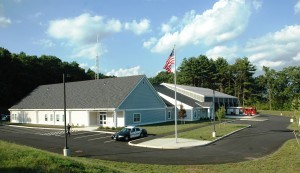
On July 14, 2010, the department relocated to a new facility at 259A E. State St. The 18,000-square-foot Public Safety Complex was constructed by Fontaine Brothers. The architect was Kaestle Boos Associates, and the owner’s project manager was Arcadis. The facility cost $6.7 million. An open house was scheduled for Sept. 11, 2010.
At the open house, there was a ribbon-cutting ceremony by the Board of Selectmen, and short speeches by state Senator Gale Candaras and state Representative Ellen Storey. A memorial bench dedicated in memory of Elbert C. Aldrich (donor of the land) was also unveiled. There was a brief tribute to the heroes of 9/11, complete with the release of several white doves. Hundreds of residents, friends and invited guests then toured the facility. Refreshments were provided. Smokey the Bear and Sparky the fire dog were present. The Hampshire County Sheriff’s Department did iris scanning for children. Ralph, the department drug dog, did continuous demos.
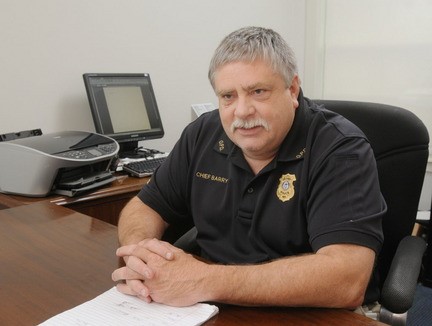
Sept. 11, 2010, also marked another chapter in the department’s history. It was the final day for Chief Louis M. Barry, who retired after 35 years as a police officer, including 23 as Granby’s chief. Lieutenant Alan Wishart was named acting chief.
In March 2011, Officer Jason Richard was activated and sent to serve our country in Afghanistan. At this time, the Selectnboard approved the hiring of a new full-time officer to fill the position left open upon Chief Barry’s retirement. Part-time Officer Steve Marion was hired as the new full-time officer and took over the court duties while Officer Richard was deployed.
In March, Carol Dent, who had retired in 2001, passed away after a courageous battle with cancer. In June part-time Officers Thomas Yvon and James LaFlamme left the department to pursue full-time careers. Officer Yvon went to the Vernon, Conn., Police Department and Officer LaFlamme went to the Erving Police Department. With the departure of these officers the department hired three part-time officers. Jeff Lawson and Wayne Mark came back to the department, and Jaime Scott-Smith was the third officer hired. Part-time Dispatcher Therese Fagnant was promoted to full-Time dispatcher.
On July 14, 2011, Alan P. Wishart Jr. was sworn in as the chief of police at a ceremony at the Granby Senior Center.
In October 2011, Officer Yvon returned to the department as a part-time officer and Officer Scott-Smith resigned. In December, Ryan Senecal was hired as a part-time police officer.
In January 2012, Officer Richard returned safely from his deployment. In February Officer Marion began the full-time police academy in Springfield. In March Officer Gary Poehler was promoted to the rank of sergeant.
In 2013, Ralph, the department’s first K-9, retired to a life of playing Frisbee with Patrolman Carpenter’s children. Also retiring in 2013 was Mike Ulmer, a long-time part-time officer. He remained with the department as an auxiliary. Construction on the department’s sally port got underway. The plan for the sally port, a secure garage, included utilizing Pathfinder High School students to complete the bulk of the work.
In January 2014, the police department’s dispatch center was awarded accreditation from its dispatch protocol provider. The accreditation involved a multifaceted review of protocols, procedures and standards of care used in the dispatch center. In March, Dispatcher Therese (Fagnant) Roman left the department for a job in the private sector. Lori Hebert was hired as a full-time dispatcher. In July 2014, Sergeant Mark Smith left the department and became the police chief in Hinsdale. In August, Ryan Senecal was hired as a full-time police officer and Michelle Palmieri was hired as a part-time police officer. In September, Steve Marion was promoted to the rank of sergeant. Steve Szlosek, another long term part-timer, retired from the department.
In January 2015, Patrolman Robert Ash announced his retirement after nearly 17 years of service. Shawn Rooney was hired as the newest full-time officer. Matthew Paquette was hired as a full-time dispatcher. Matt left shortly thereafter to accept a position with Chicopee Police. He was replaced by full-time dispatcher Beth Dunnigan. In March, Kendall Hill joined the department as a part-time pfficer. In November, Officer Rooney was injured while attending the Municipal Police Academy and eventually had to retire because of his injuries. In December, Ryan Barthelette joined the department as a part-time officer.
The department began providing the life skills program to students at East Meadow School. The program replaced the DARE Program. The collaborative program is taught by police, teachers and other students.
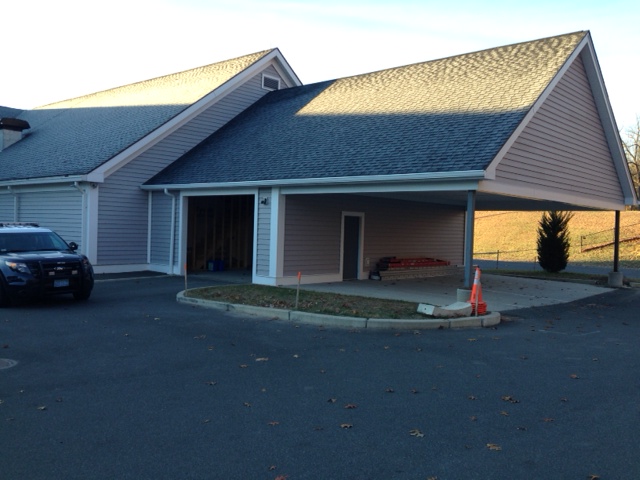
The construction of the sally port was completed. The final cost, at just under $100,000, was about one-third of the original estimate for its construction. The savings was largely due to the use of Pathfinder High School students to complete the work.
In January 2016, part-time Officer Mark Johnson retired after nearly 31 years of service. In April, part-time Officer Wayne Mark left the department. In August, Zacharie Gilley joined the department as a part-time officer.
In February 2017, Sergeant Kevin O’Grady was promoted to lieutenant. This was a position that had been vacant for 16 years. Chief Wishart had filled the position as acting lieutenant prior to becoming chief.
In April 2017, dispatcher Beth Dunnigan left the department and went to Holyoke Fire. In May, Patrolman Earl Brown was hired as the department’s newest full-time patrolman. In June, part-time Officer Paul Anderson left the department; Lee Surette was hired as the new full-time dispatcher. In October, the department purchased three Taser guns that officers were trained with and carry on their duty belts. Thanks to a very generous donation, in December, by an anonymous family in town, the department was able to purchase two more Tasers.
In March 2018 Ralph, the department’s retired K-9, passed away at the age of 15. Thanks to a very generous donation in October, by an anonymous family in town, the department was able to purchase an additional Taser and it has been put into service. In December 2018, Dispatcher Lori Hebert left the department and went to East Longmeadow Police Department.
In January 2019, part-time patrolman Wade DuBois retired from the department. Part-time patrolman Jeffrey Lawson was appointed to the vacant full-time dispatch position. In March, part-time patrol officer Kendall Hill was promoted to full-time and began the academy in June. In April, part-time patrol officer Michelle Palmeri resigned from the department. In June, part-time patrolman Zacharie Gilley was promoted to full-time and then attended the police academy. Detective Barbara Fenn received a job-related disability pension because of an injury she received in the line of duty.
In 2000, the department celebrated its 50th anniversary on Oct. 20 at the Chateau Provost in Chicopee. Many plaques, awards, and citations were received by the department. Gary Poehler became a part-time officer, as did Kevin Irving.
The new Millennium came and went without incident. The DARE and school resource officer programs continued to be a success. The sixth annual basketball camp was held that summer, as was the annual Police/Senior Cookout.
The department offered RAD (Rape Aggression Defense) classes to women.
The department continued its commitment to youth, sponsoring a summer basketball league, seven winter teams, nine summer league teams, Mickey Mantle Baseball, Saturday School, open gym, various after-school activities, and a weight training program.
The department also restored its juvenile diversion program. An up-to-date networked computer system came online, with mobile data terminals in the cruisers and Enhanced 911. All officers were issued bulletproof vests. The Police Association, as the result of a generous donation, purchased brand new Glock .40-caliber handguns for each officer.
The year also saw the retirement of long time department member Lieutenant Normand Renaud, whose career began in 1979. He had served as a patrolman, the department’s court officer, a lieutenant and as acting chief.
A federal grant was received allowing us to fill five part-time dispatch positions. Mike Roney was hired as a part-time dispatcher. We continued our community policing efforts, with the DARE Camp, SALT picnic, and sponsorship of basketball, baseball and soccer teams. We offered RAD classes, a ski trip and after-school activities.
In 2001, long-time dispatcher/secretary Carol Dent retired. She was the “daytime voice” of the department for many years. She also conducted sexual assault investigations for the department. Lynn Menard, the M-8 dispatcher, moved to the day shift, and Mike Roney was hired full-time as the M-8 dispatcher.
Barbara Fenn was hired as Granby’s first full-time female police officer. She replaced the retired Lieutenant Renaud. Jeff Reed and Kurt Carpenter were hired as part-time officers. Charlene Fernandes, Amanda Jackson and Jason Richard were hired as part-time dispatchers.
The retirement of Lieutenant Renaud left a void in the management ranks. The decision was made to promote two officers to the rank of Sergeant: Bill Eskett and Al Wishart.
The department received a three-year, $50,000 New Horizons for Youth Grant to provide after-school programs for our youth. We continued to offer DARE and other community-based programs.
It was noted in the annual report that the somewhat rural, scenic nature of the town did not make us exempt from crime. That year saw a gang rape of a 14-year-old girl, an armed home invasion and an armed robbery, where shots were fired.
The events of 9/11 also impacted the town. There were many complaints of suspicious packages, and security near Westover Air Reserve Base was increased.
A proposed municipal complex, which would have included a new police facility, was defeated at Town Meeting. An extension was requested for the lease of the state building.
In 2002, the state legislature approved a bill encouraging employees to take early retirement. The measure was accepted by the town, and the department lost several longtime members (Detective David Trompke, Wayne Sedlak, Sergeant Ted Smigiel, and Patrolman Wilfred Merullo). Dennis Fitzgerald became a part-time dispatcher.
Patrolman Mark Smith became the department’s new detective. Kevin Irving became the department’s new school resource officer. He was the first African American officer hired by the town.
Part-time officers Bob Ash, Gary Poehler and Kurt Carpenter became full-time officers. Officer Fenn graduated from the academy and took over as the sexual assault investigator. Mike Roney became a part-time officer. His dispatch position was filled by Amanda Jackson. Part-time dispatchers Dennis Fitzgerald and Jason Richard became part-time officers. Sean Rooney and Shawn Gallagher became part-time dispatchers. Patrolman Mike Chevalier was injured on duty, and was out on extended injury leave. Jeff Reed became a part-time police officer.
DARE funding was eliminated, jeopardizing the program and the summer basketball camp. Fortunately fundraisers were held to keep these programs going — at least temporarily.
In what seems to be a reoccurring theme, 2003 budget cuts required that five part-time shifts be eliminated. Patrolman Irving resigned his position. Patrolman Poehler graduated from the academy, and Patrolman Kurt Carpenter replaced Patrolman Kevin Irving as the school resource officer. Through grants, the department purchased defibrillators for each cruiser. Patrolmen Sean Rooney and Shawn Gallagher joined the department part time. Patrolman Richards was called to active duty and was deployed to Iraq.
Radio communication problems were finally solved by placing a repeater on a cell tower in town. The Fire and Highway departments also utilize the tower.
The department court cases were transferred to Hadley District Court.
Patrolman Kevin O’Grady was hired as a full-time officer. Dispatcher Amanda Jackson became a part-time police officer. John Ferriter was hired to replace Jackson as a full-time dispatcher. Part-time Officer Fran Foley moved south, and part-time Officer Dennis Fitzgerald became a full-time Belchertown officer. Mike Roney left for Belchertown PD. Sean Rooney, Mike Reyes, Jeff Lawson and Wayne Mark became part-time officers. Amber Dubois and Bonnie Tetreault were hired as part-time dispatchers. Bonnie took a leave due to a college trip and Peter Lantaigne was hired to fill her position. Officer Fenn became the department’s court officer.
Community policing grants allowed us to maintain our equipment and continue our programs. Private fundraising supported DARE. That year we initiated a citizens police academy and a summer cheer camp for girls.
In 2005, the department suffered a great loss when 23-year-old part-time officer Amanda Jackson died of liver cancer. Retired Patrolman Wayne Sedlak and former part-time Officer Richard Hooper also passed away of cancer. All are sorely missed, but not forgotten.
Mike Chevalier received a job related disability pension due to an injury he received in the line of duty. Patrolman Jason Richard, who returned safely after a tour in Iraq, was hired as his replacement. Joining the department as part-time officers were Steve Marion, Ian Howard, and Tom Yvon. Part-time dispatcher James White was also hired.
The department also purchased its first K-9. After some success utilizing State Police narcotic detection dogs in the schools, the idea was brought forth to purchase our own non-aggressive narcotic detection dog to use in the school along with the SRO. After a very brief but highly successful fund raising effort, $6,500 was raised and “Ralph” was purchased from Tarheel Kennel in North Carolina. SRO Kurt Carpenter went for training, and Ralph was then introduced into the schools.
Ralph’s presence virtually eliminated narcotics from our schools. In addition, he patrols with his handler and had made more than 100 ”hits” resulting in drug seizures and arrests. He is trained to detect marijuana, cocaine, heroin and methamphetamines.
During 2005, Mark Smith was promoted to the position of sergeant. Barbara Fenn became the department’s detective, and Kevin O’Grady became the department’s court officer.
In 2006, James White became a part-time officer. Bonnie Tetreault returned from leave. Due to budget cuts, school resource officer funding was eliminated from the school budget after having been funded by a Proposition 2½ override two years earlier. This position was restored on a part-time basis through the efforts of the town administrator and the cooperation of the schools.
A Secure Our Schools grant paid for the purchase of an ID system to use throughout the town, as well as security improvements to the schools. Community policing funds continued to pay for various programs.
In 2007, Sergeant Eskett announced his retirement. Part-time Officers Wayne Wilson and Irene Golfieri also retired, and part-time Officer Wayne Mark left the department. Paul Anderson, Diane Jensen, Earl Brown and Eric Jorgensen were hired as part-time officers.
The town also received new 911 equipment with GPS capability, a grant for surveillance equipment, and a community policing grant that paid for programs and equipment replacement.
The town also reactivated the public safety building committee with Police Chief Barry and Fire Chief Russ Anderson as ex officio members. In a short period of time this committee made excellent progress toward a new facility. The department applied for a grant through a state program, receiving more than $83,000 toward the project. At the end of 2007, the town voted to appropriate $1 million for partial funding of a new public safety facility.
In 2008, Kevin O’Grady was promoted to sergeant. Patrolman Jason Richard was named as the new court officer.
In 2009, Sergeant Alan Wishart was promoted to the rank of Lieutenant. The department then consisted of the chief, one lieutenant, two sergeants, a detective, a court officer and 20 patrolmen (full and part-time), as well as two full-time and three part-time civilian dispatchers.. One of the patrolmen is the school resource officer, and one is the department’s Drug K-9 handler. The department had four marked cruisers, one unmarked cruiser and a four-wheel-drive vehicle.
At Town Meeting, the Public Safety Building Committee received $5.6 million from the Municipal Building Account. The committee consisted of James Trompke, Lillian Camus, Wilfred Merullo, Bill Parent and Ed Parker. Chief Barry and Chief Anderson were non-voting members. Various police, fire and public safety departments in the area were visited in the spring of 2008. An architect, Kaestle Boos, was hired, and plans were drawn during the summer of 2008.
Planning Board approval was sought, and as per state requirements, an owner’s project manager (Pinnacle One) was hired. The tedious, often times frustrating municipal building construction procedure was followed. Fontaine Brothers of Springfield was hired as the general contractor.
During the winter months the plans were redrawn again to ensure that the project stayed within the allotted funds. The project was put out to bid, and finally, on June 5, 2009, ground was broken for the new facility.
In 1990, all court cases originating in the Town of Granby were moved to the Ware District Court, due to an act by the Legislature. Brothers Dan and Bill Menard were hired as part-time officers.
Through a donation by the American Legion, the department purchased its first fax machine. Patrolman Pronovost left the department, to go to the Amherst Police Department. His position as DARE officer was filled by Patrolman Mike Kotowski. Mike attended the 16-week academy in Agawam.
In 1991, budget problems continued to haunt the department. Two override votes were defeated. Ninety-six hours of police coverage were eliminated. The juvenile diversion program was eliminated. Safety and crime prevention programs were curtailed. Union concessions were needed just to keep patrols on a 24-hour basis. On a more positive note, negotiations with the state for the department to occupy a building on West State Street were underway. Rhonda Haska became matron.
In 1992, the department again faced a fiscal crisis. This time an override vote passed, allowing the department to maintain patrols around the clock. Mike Kotowski resigned to accept a position with the Chicopee Police Department. Dan Menard was hired to replace him and attended the academy in Agawam. Tara Menard was appointed a matron.
The town voted, at a special Town Meeting, to appropriate $40,000 to renovate a state-owned building as a new (temporary) police station. The building was a former dinosaur museum, located at 194 West State St. The building had been constructed by the owner of the property after discovering dinosaur tracks on the property. He ran it as a combination museum/coffee shop. Ultimately the property was sold to the state. The former residence was occupied by state employees, and the museum was partially renovated and was used as an office. The intention was to reopen the property as a working museum. A shortage of funds prevented the conversion, and the property was declared “excess”. A 10-year, rent-free lease was negotiated between the state and town to use the building as a “temporary” police station.
In 1993, renovations on the building began. Students from the Lower Pioneer Valley Hampshire Educational Collaborative provided carpentry help and landscaping. Pathfinder High School students did the electrical work. Officers, their families, and volunteers did much of the finish work and painting, and built an addition. Furniture was donated by Heritage Bank. A flagpole was donated by the Granby Telephone and Telegraph Co. The Highway Department did excavation work and built the parking areas.
On Nov. 30, the department moved into its new facility, with Patrolman Steve Flanagan on the dispatch desk. Ownership of the building remained with the state.
Joining the part-time department that year was Tim Brock, Mike Chevalier Sr., Steve Flanagan, Fran Foley and Mike Ulmer.
In 1994, a grant provided by the state allowed Granby Police to begin DARE-related activities outside of the core program. In the summer, a volleyball program was held at Brown Ellison Park. The department also began TRIAD, forming a SALT Council (Seniors and Law Enforcement Together) in cooperation with the Sheriff’s Department, the District Attorney’s Office, and Protective Services. Patrolmen Dan Menard and Larry Carmen were the Department’s DARE officers.
In 1995, after what seemed like an eternity of delays, the town received enhanced 911 service. This allowed the department to see the address of any 911 call placed to the station on a display screen. Al Wishart was hired as a part-time dispatcher.
The department received a $75,000 grant from the Justice Department to hire an additional full-time police officer. We also received $15,000 to refurbish our computer system, and a $6,000 DARE Grant. In addition, $15,000 was received in community policing funds. That money was used for training and crime prevention efforts. Also held was the first annual Police/Senior Citizen Cookout, which was a great success.
The DARE Program held its first annual basketball camp in the summer. About 200 attended the two-week program. In addition, the DARE Program sponsored a summer basketball team for high school youth, an after school hiking club, and a volleyball program.
The town was saddened by the loss of two town officials, Town Clerk Pat Masiuk and Town Counsel Ray Randall. Mike Chevalier was hired through a grant as a full-time officer.
New part-time officers were Al Wishart, Joe Reidy and Mark Smith.
In 1996, the new computer system was up and running. The department went online with a website developed by Patrolman Bill Eskett. Community policing money was used to train senior citizens in the use of computers and the Internet as part of the SALT program. DARE activities included the basketball camp and after-school activities, as well as team sponsorships.
The department was also designated as a pilot town for the Safe Roads Program. This program allowed us to receive enforcement grants for seat belts, speeding and other motor vehicle ;aw enforcement.
The town adopted the Quinn Bill, which reimburses the town 50 percent of the funds they pay the officers for receiving college degrees. The department also worked in conjunction with the Playground Commission and Granby Junior Senior High School to revitalize the basketball court outside the high school.
Bill Glover, Robert Ash, Kellie Cournoyer and Kevin O’Grady joined the department as part-time officers.
In 1997, the department continued its active community policing role. DARE Camp and team sponsorships, the annual Police/Senior citizen cookout, and TRIAD were just a few of its activities. Al Wishart became a full-time officer. The department also began a school resource officer (SRO) program. Patrolman Alan Wishart, the Town’s DARE officer, started in the high school one day per week, serving as a resource to faculty, administration and students.
In 1998, the school resource officer position was expanded to two days per week. The DARE Program continued to sponsor youth sports. Community policing money was used to rebuild two basketball courts behind East Meadow School, in conjunction with Granby Public Schools.
In 1999, the town received a grant of more than $100,000 to fund a full-time school resource officer position, which was filled by Patrolman Mark Smith. The department continued to work closely with our youth, sponsoring winter basketball teams, baseball, spring soccer, and many after-school activities. Wade Dubois and Barbara Fenn became part-time officers. The department also collaborated with local schools on a “Saturday School Program” for the students with academic, truancy or behavioral issues.
In 1980, Chief Kirchhof noted that there was a large turnover in personnel “within the past few years.” Carol Dent was hired to replace Cathy Camp, who retired from her position as secretary/dispatcher, and several auxiliary officers were promoted to the part-time force.
In 1981, the department took over the responsibility of answering the Fire Department emergency phone. Chief Kirchhof stresses in his annual report that the basement of the Town Hall, home of the police station, was inadequate for the department. He also wrote that officers are often on patrol by themselves.
Turnover in personnel continued to be a problem. Six officers left in 1982. In August 1982, Nathan Swistak was hired as a full-time dispatcher and part-time patrolman. The chief again noted the inadequate facility and the lack of manpower as conditions that the Department must operate in.
In 1984, an additional officer was added to the Police Department. Patrolmen Roger Tucker and Wilfred Merullo attended the Police Academy, run by the State Police, which was 13 weeks long.
In 1985, Chief Kirchhof announced that he was resigning his position in order to accept a position as chief in Wilbraham. Lieutenant Galipeau and Sergeant Gay both retired. The department lost its entire command staff within one year. Patrolman Swistak completed the fifth MPOC in Agawam and became a full-time patrolman.
In 1986, Normand Renaud was appointed acting police chief. Roger Tucker, who had been promoted to the rank of sergeant, also left his position to go to Wilbraham. Merullo and Ted Smigiel and were named acting sergeants to assist in running the department. Patrolman Chris Prononvost was hired as a full-time officer, and he attended the full-time police academy at Agawam. The American Legion donated a video camera to record the booking of prisoners. Funds were appropriated to remodel the basement and to purchase the department’s first computer/teletype system.
Also in 1986, the department lost a valuable member when Special Officer/Criminalist Warren Messenger died. His expertise in photography and forensic prints was greatly missed.
That year, selectmen appointed a police advisory board to help in the hiring selection process. The board has proven to be invaluable to the department in maintaining a high-quality level. It is utilized for hiring and promotions, and it interviews and recommends to the Board??? on appointments. Through the years, the town has been fortunate to have excellent membership on the advisory board.
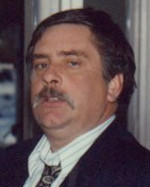
By the end of 1987 the staff was as follows:
- Chief of Police: Louis M. Barry
- Lieutenant: Normand Renaud
- Sergeant: Theodore Smigiel
- Patrolman: David Trompke, Wilfred Merullo, William Eskett, Christopher Pronovost, Tom Robert
- Part-time officers: Cathy Camp, Carol Dent, Robert Dufault, Michael Frenette, William Glenny, Irene Golfieri, Richard Hooper, Mark Johnson, Mike Kotowski, Dennis Laplante, Barbara O’Connor, Jeanette Peltier, John Pronovost, Jeffrey Quinlan, Steve Szlosek, Wayne Wilson, Adam Woodrow
- Secretary/Dispatcher: Carol Dent
In 1988, the department received an $8,200 grant for the purchase of computer equipment. Lynn Menard was hired as a full-time dispatcher, replacing Jeannette Peltier.
The town also began the DARE Program in the East Meadow School, being one of the first in Western Massachusetts to do so. The drug education program was taught by Patrolman Chris Pronovost.
1988 also saw the establishment of the department’s first detective position. David Trompke was given this assignment. Dennis Laplante was hired as a full-time officer and attended the Barnstable County Police Academy. Dennis was placed in charge of the Auxiliary Police, which purchased its own cruiser for training purposes. The majority of our officers, full-time and part-time, began their careers with that organization. Carlos Alcaide and Rich Beaulieu were added to the part-time force. Bill Glenny retired.
In 1989 the department began to feel the fiscal crunch brought about by Proposition 2½. Training was curtailed by the criminal justice training council. The DARE Program was cut from the budget, but fortunately saved by private donations. Officer Dennis Laplante left for another agency. Because of the bleak financial condition of the town, his position was not filled. Larry Carmen , Ron Molway and Ron Smigiel all joined the part-time force. Diane Woznicki and Mary Anne Bellrose were matrons.
The department began a juvenile diversion program, offering a non-court alternative to youthful, first-time offenders. The department also subscribed to LETN, a satellite-based training system.
In 1970, the department purchased its first complete radio system as the result of a federal grant.
Dwight Tucker, a veteran part-time officer, was added to the full-time force in 1971. During that year, Chief Kirchhof received his college degree. All other full-time officers were attending college under a federal grant program, and Patrolman Tucker graduated from the six-week Springfield Police Academy. All officers attended a State Police radar course and were certified as qualified traffic radar operators. The department purchased its first radar unit that year.
In 1971 was also the year in which the town had its first homicide “in recent memory.” A suspect was in custody and awaiting trial at the time of the annual report.
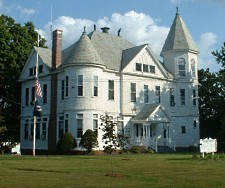
In 1973, the department added part-time Patrolmen Medard Viens and David Trompke to the full-time staff, bringing the number of officers to seven. Through a federal grant, the department, with the assistance of the Massachusetts Police Institute, drew up its first formal rules and regulations. Also, school zone lights were installed thanks to a state grant.
In 1975, the department became a true “full-time” force, with patrols around the clock and the station open 24 hours per day.
In 1976, the department purchased its first Breathalyzer unit through a state grant. The department also received a base radio and three mobile radio units that allowed communication with 24 other departments in the Pioneer Valley. This system, known as WMLEC, is still in use.
In 1978, department members, with the exception of the chief and lieutenant, joined a union, Local 321 of the International Brotherhood of Police Officers, to which they still belong. An additional officer was added to the force, bringing the force up to eight full-time officers.
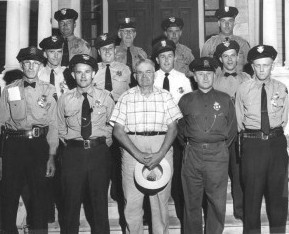
Members of Granby Police Department, c. 1968. Front row (from left): Former Chief William Gallup, Dwight Tucker, Eugene Bissell, Eugene Rimbold, Chief George Randall. Middle row (from left): Myron Ingham, Adleard Fournier, Joe Lajoie and Edmund Robert. Back row (from left): Ed Martin, Wilfred Loiselle, Robert Noble, and John A. Baker.
In 1960, police patrols were limited to three nights each week, along with some special patrols. Church traffic was supervised by regular and auxiliary police who donated their services. By 1964, there were patrols out every night of the week, as well as during the daytime.
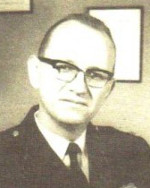
He noted in his annual report that the department was run weekdays directly from the new “headquarters.” He also mentioned that under construction was a building which would give the department more office space, a lock-up and vehicle garage space. For some reason this building, the former Highway Department to the rear of Town Hall, was never occupied by the force, and the department remained in the one-room office for two more years.
In 1968, the Granby Police Department reorganized. All former ranks, with the exception of chief, were eliminated. Two full-time police officers were appointed from the part-time ranks: Lieutenant Adelard Fournier and Patrolman Raymond A. Bergeron.
In 1969, the department relocated to the basement of the Town Hall. Funds for materials were appropriated, and the renovations were done by the officers who donated their time. There were still times when the department was not staffed, and officers had to be called in from their homes in an emergency.
Throughout the 1960s and the 1970s, the department relied heavily on part-time officers.
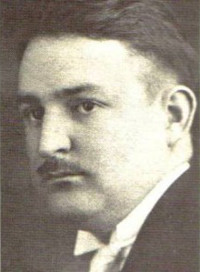
Chief Cloutier was joined the following year by part-time officers Ed Martin and Dwight Tucker. In 1951 the police budget was $1,000. They had no vehicle, no radios, and no equipment. The chief’s home served as the police station. In its first year, the department issued 21 citations and investigated seven accidents.
In the 1952 annual report, Chief Cloutier thanked the St. Hyacinth Seminary for allowing the department to use the baseball diamond for a police-sponsored baseball team. He also noted that the School Committee allowed use of the auditorium (upstairs in Kellogg Hall) for its boys’ basketball program two nights a week.
In 1953, the Police Association was formed, and the department purchased its first radio.
In 1954, George Randall became police chief. He noted in his annual report how valuable the department’s radio was, stating ”it was used to call the ambulance in South Hadley,” helped in several arrests and helped communicate with Western Mass. Electric Company during hurricanes Carol and Edna. He also wrote “the Department is made up of 22 men, 5 constables and 17 special police officers. Ten of the men have uniforms which they purchased themselves.” Also, Phyllis Lalonde was appointed as the first female member of the department.
In 1956, the department purchased its first police cruiser, The price was $2,489.
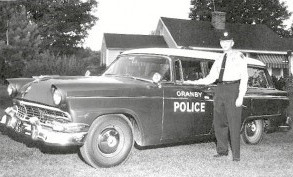
The purchase did not come without controversy. Residents voted at a February town meeting to purchase the vehicle. A petition was circulated and presented to the selectmen with 161 names to vote again on the article. In a special town meeting in April, the vote came out the same and the cruiser was purchased. There were 1,166 registered voters at the time.
The Town of Granby continued to grow, and with it so did its police department. On Feb. 23, 1957, William W. Gallup became police chief, and he also was the town’s first full-time police officer. Chief Gallup continued to work out of his home and was assisted by numerous “special” police officers.
Radio calls were answered by Mr. and Mrs. Robert H. Dressel, who, as recognized by Chief Gallup in 1959: “In addition to manning our two-way radio from their service station, they now operate our own town ambulance.”
